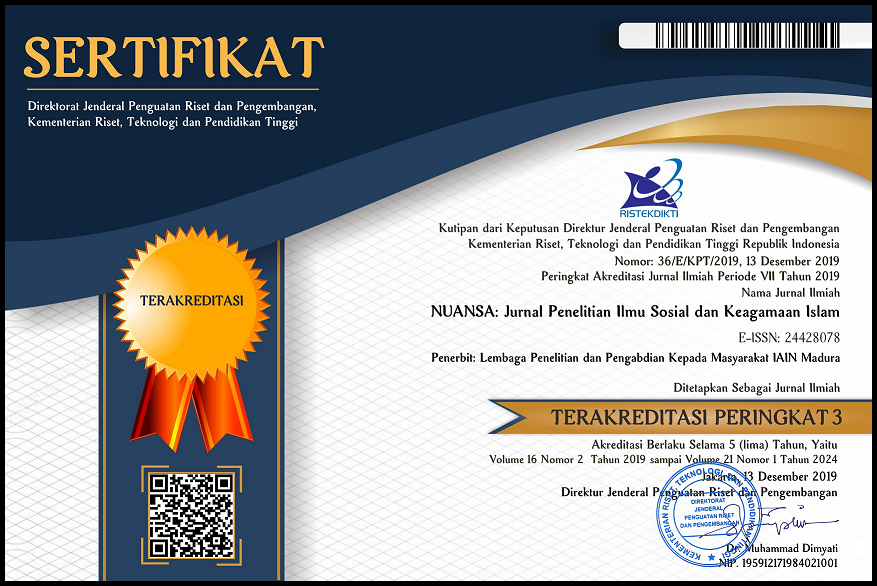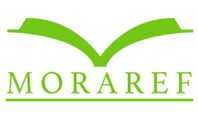KOMPETENSI PAEDAGOGIK CALON GURU PENDIDIKAN AGAMA ISLAM (Studi Tentang Kompetensi Paedagogik Mahasiswa Jurusan Tarbiyah Program Studi Pendidikan Agama Islam STAIN Pamekasan Tahun akademik 2016)
 Abstract views: 172
,
Abstract views: 172
,
 PDF downloads: 109
PDF downloads: 109
Abstract
This research is focused on a few things here, How the ability level of the students of Islamic Education Department in planning learning of Islamic Education or Pendidikan Agama Islam (PAI) is?, How the level of ability of the Students of PAI in the understanding of learners in the learning PAI is? How the level in the mastery of students in managing the material ajarPAI is? How the skill level of the students in implementing the approach /strategy of learning is? How the level of skill of students in utilizing resources and media of learning is?, How the skill level of the college students in involving students in teaching learning process is? How the skill level of the student in carrying out the evaluation of learning?
This research is a descriptive research. sampling technique using proportional random sampling. Data collection methods used is questionnaire.The validity used was the validity of the content and to determine the reliability using Cronbach Alpha formula. Data analysis that used is descriptive quantitative with percentage.
The results of this study showed that the general competence paedagogik student PAI STAIN Pamekasan semester 6 academic year 2016. Of some of the indicators there has been no showing the highest numbers in the scale of Linkert. From some aspects it looks that (1) in ability to plan learning PAI. (2) the Competence of the PAI students in understanding the learners do to prepare physically such as setting up equipment and checking the presence of students in the learning process.
And there are only a few students who do pre-learning by preparing students for psychic. (3) the student's Competence in managing the teaching materials look when doing appersepsi at the beginning of learning, the ability in mastering teaching materials, the ability to associate the teaching materials with other relevant knowledge, the ability to notice the material clearly in accordance with the hierarchy, as well as the ability in linking the striker with the reality of life. On these capabilities, yet there are students who are able to reach the maximum level on a scale of linkert, (4) the Ability in implementing the approach and strategies of learning can be seen from the ability of students on teaching practice in terms of implementing the learning in accordance with the competencies to be achieved, implementing the learning coherently in accordance with the sintax, mastery class, the implementation of learning that is konstektual, the implementation of learning that cultivate the habit of positive, carry out learning in accordance with the allocation of time planned. On the indicator of the ability of ability have not shown the maximum results in the these aspects, (5) the Ability to utilize learning resources and teaching media can view of the ability in using the media y effectively and efficiently, the ability to produce messages of interest from the media, as well as the ability to engage students in the utilization of media. From the aspect these aspects have yet to show optimal results, the average ability students only at the level of 4 on a scale of Linkert, (6) aspects of the ability to evaluate students is very weak. Even the majority of students do not carry out the final assessment and also the process.Downloads
References
Achmad Sanusi, Studi Pengembangan Model Profesional Tenaga Kependidikan,(Bandung; FPS IKIP,1990)
Akadum, Studi Tentang Profesionalisme Guru di Indonesia, Paper Seminar (UNY Yogyakarta,1999)
Ary H Gunawan.(1996). Administrasi Sekolah: Administrasi Pendidikan Mikro.Jakarta:Rineka C ipta.
Asep Supriatna, Hubungan antara pengembangan Profesionalisme dengan kinerja Dosen Dalam Meningkatkan Prestasi Belajar Mahasiswa (kajian pada semester VI 2002-2003 fakultas Keguruan dan Ilmu Pendidikan.(Bandung; PPS UPI, 2003)
C. Suryosubroto (2004). Manejemen Pendidikan di Sekolah. Jakarta: Rineka Cipta.
D, Spark dan A.Geist. A New Vision for Staff Development,(Alexandria; ASCD, 2002)
Dedi Supriadi, Reformasi Pendidikan dalam Konteks Otonomi Daerah , (Yogyakarta: Adicita, 2001)
Depdikbud. (1993). Petunjuk Pelaksanaan Jabatan Fungsional Guru. Jakarta, Dirjen Dikdasmen
Depdiknas. (2003). UU RI No. 20 Tahun 2003 Tentang Sistem Pendidikan Nasional. Jakarta : S inar P ustaka.
Djohar. (2006). Guru, Pendidikan dan Pembinaannya ( Penerapannya dalam Pendidikan dan Undang – Undang Guru ). Yogyakarta : S inar Grafika.
G. X. Sudarsono. (1988). Bimbingan Penulisan Karya Ilmiah. Yogyakarta: FIP IKIP Yogyakarta.
Ganefri. (1996). Kinerja Karyawan Lulusan Sekolah Menengah pada Perusahaan Listrik Negara Cabang Padang. Tesis: IKIP Yogyakarta.
Gimin. (1997). Intensitas Kegiatan Musyawarah Guru Mata Pelajaran, Frekuensi. Kompetensi Dasar Mengajar, Dan Performasi Mengajar. Jurnal Ilmu Pendidikan Jilid 4 No 2 Tahun 1996.
Hamzah B. Uno. (2001). Pengembangan Instrument Penelitian. Jakarta: Delima Press.
Husaini Usman. (2006). Manajemen. Jakarta: Bumi Aksara.
Ibrahim Bafadal. (2006). Peningkatan Profesionlisme Guru. Bandung: Bumi Aksara.
Indra Jati,S idi. (2001). Menuju Masyarakat Belajar: Menggagas Paradigma Baru Pendidikan. Jakarta: Logos Wacana Ilmu.
Jiwo Wungu dan Hartanto Brotoharsojo. (2003). Tingkatkan Kinerja Anda Dengan Menit Sistem. Jakarta: Raja Grafindo Persada.
Kunandar. (2007). Guru Professional: Implementasi Kurilulum Tingkat Satuan Pendidikan(KTSP)
Lukman Ali, dkk. (1995). Kamus Besar Bahasa Indonesia. Jakarta: Balai Pustaka.
Mahmudi. (2005). Manajemen Kinerja Sector Public. Yogyakarta: AMP YKPN.
Masnur Muslich. (2007). Kurikulum Tingkat Satuan Pendidikan: Dasar Pemahaman dan Pengembangannya. Jakarta: Bumi Aksara.
Masnur Muslich. (2007). Kurikulum Tingkat Satuan Pendidikan: Pembelajaran Berbasis Kompetensi dan Konseptual. Jakarta: Bumi Aksara.
Miles, Matthew B., A. Michael Huberman. (1992) Analisis Data Kualitatif , Jakarta: UI. Press,
Moekijat. (1995). Manajemen Personalia dan Sumber Daya Manusia. Bandung: Mandar Maju.
Muh. Joko S usilo. (2007). Kurikulum Tingkat Satuan Pendidikan. Yogyakarta: Pustaka Pelajar.
Muh. User Usman. (1994). Manajemen Guru Professional. Bandung: Remaja Rosdakarya.
Muhaimin, (2013) Rekonstruksi Pendidikan Islam: Dari Paradigma Pengembangan, manajemen kelembagaan, kurikulum hingga Strategi Pembelajaran.(Jakarta: Rajawali Press,
Muhaimin, Renungan Keagamaan dan zikir Kontekstual (Upaya Membangun Kecerdasan Spiritual) (Malang: LKP2-I),
Mulyasa E. (2007). Kurikulum Tingkat Satuan Pendidikan. Bandung: Remaja Rosdakarya.
Mulyasa E. (2007). Standar Kompetensi dan Sertifikasi Guru. Bandung: Remaja Rosdakarya.
Mushollin, Mulyadi dan Sri Handayani, (2010) Marketing Pendidikan Tinggi Islam, (Aplikasi Teori Marketing di STAIN Pamekasan),Pamekasan; P3M, penelitian Kolektif.
Nazir, M., Metode Penelitian. (Jakarta: Ghalia Indonesia, 1985),
Pupuh Fathurrahman dan Aan Suryana, Guru Profesional, (Bandung; Replika Aditama,2012)
Rahman Natawijaya, Studi Pengembangan Model Pendidikan Profesional Tenaga Kependidikan (Jakarta: DEPDIKBUD,1991)
Santoso S. Hamijoyo. (2002). Status dan Peran Guru : Akibatnya pada Mutu Pendidikan untuk Masyarakat Indonesia. Jakarta: Gramedia Widiasarana Indonesia Center.
Sardiman.(2006). Interaksi dan Motivasi Belajar Mengajar. Jakarta: Raja Grafindo Persada.
Siswanto Sastrohadiwinoto. (2003). Manajemen Tenaga Kerja Indonesia. Bandung : Bumi Aksara.
Sudarwan Danim, Profesionalitas dan Etika Profesi Keguruan, (Bandung; Penerbit Alpabheta, 2010)
Sudarwan, Danim. (2002). Menjadi Peneliti Kualitatif. Bandung : P ustaka Setia.
Suharjo. (2006). Mengenal Pendidikan Sekolah Dasar: Teori dan Praktek . Jakarta: Depd iknas.
Suharsimi Arikunto, dkk. (2002). Buku Pegangan Kuliah Menajemen Kurikulum. Yogyakarta: Jurusan Administrasi Pendidikan
Suharsimi Arikunto. (1989). Prosedur Penelitian: Suatu Pendeketan Praktis. Jakarta :Bumi Aksara.
Suparlan. (2008). Menjadi Guru Efektif. Yogyaka rta: Hida yat.
Surya Dharma. (2005). Manajemen Kinerja: Filsafat, Teori, dan Penerapannya. Yogyakarta: P ustaka Pelajar.
Sutrisno Hadi. (1993). Metodologi Research untuk Penulisan Paper, Skripsi, Thesis dan Desertasi Jilid 1. Yo gyakarta : Fakultas Psiko logi UGM.
Syaiful Bahri. (2000). Guru dan Anak Didik dalam Interaksi Edukatif. Jakarta Rineka C ipta.
Syaiful Sagala. (2007). Manajemen Strategik dalam Peningkatan Mutu Pendidikan. Bandung: Alfabeta.
W. Djojonegoro, Kebijakan Operasional Wajib Belajar 9 Tahun, Majalah Prisma No.5 Tahun 1998, Jakarta: LP3ES.
Wahyudi. (2006). Manajemen Konflik dalam Organiusasi. Bandung: Alfabeta
. (2005). UU RI No. 14 Tahun 2005 Tentang Guru dan Dosen. Jakarta: Sinar Grafika.
The journal operates an Open Access policy under a Creative Commons Attribution-NonCommercial 4.0 International License (CC-BY-NC) 
Authors who publish with this journal agree to the following terms:
- Authors retain copyright and grant the journal right of first publication with the work simultaneously licensed under a Creative Commons Attribution License that allows others to share the work with an acknowledgement of the work's authorship and initial publication in this journal.
- Authors are able to enter into separate, additional contractual arrangements for the non-exclusive distribution of the journal's published version of the work (e.g., post it to an institutional repository or publish it in a book), with an acknowledgement of its initial publication in this journal.
- Authors are permitted and encouraged to post their work online (e.g., in institutional repositories or on their website) prior to and during the submission process, as it can lead to productive exchanges, as well as earlier and greater citation of published work.






















